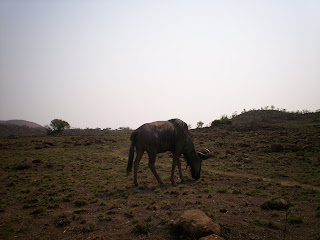
“Flamingoes!”
I smsed my friend. Indeed to my right, a large wetland area appeared covered in places by a pink sheen. Flamingoes flying, flamingoes standing, fishing. Incredible.
I had been on the road for six hours and switched Khumbis four times to get here, but in a few moments I would arrive in Kimberly. The large wetland area is a tourist attraction here and one of the largest gatherings of these oddly elegant waterfowl in the world.
This past weekend I took a trip to a neighboring town/city, which is where two volunteers are stationed. The town, Kimberly, is immersed in the sort of quirky history that the English are exceptionally good at telling.
Kimberly’s birth came from diamonds being found in a nearby field. This is the town where the De Beers mine is located and where the headquarters of De Beers mining company is located. It was here that John Cecil Rhodes literally drew the modern map of southern Africa, though now Northern Rhodesia is called Zambia and Southern Rhodesia is called Zimbabwe.
The McGregor museum is Kimberly’s largest, so a fellow volunteer and I decided to scope it out. It was particularly interesting in both what it contained and what it did not contain. Though extensive effort had been made to incorporate the history of the native Africans into the museum, it seemed the history stopped when the diamonds were discovered. This is by no means the fault of the original curators, as the English are notoriously good at recording history, making even some mundane activity noteworthy of extracting from a diary and placing on a museum display. The Africans were not as good at this or at least it didn’t seem so from the exhibit, and so the exhibit was fairly Anglo-centered.
The building itself, an old Sanatorium (fancy word for old fashioned health retreat) was wonderful in all it’s Victorian splendor. Altogether quintessentially British. The town itself retains trappings from that era, from beautiful cathedral that I was told had the longest nave in Southern Africa... or was it the South Hemisphere... regardless, it was a massive structure built a century ago- stepping inside it is like taking a step back to those times, to the parks and buildings, all steeped in English charm.
But Kimberly is not British, it is South African. While I was there I attended the finals to a province-wide cultural dance contest, which was incredible. to be continued











